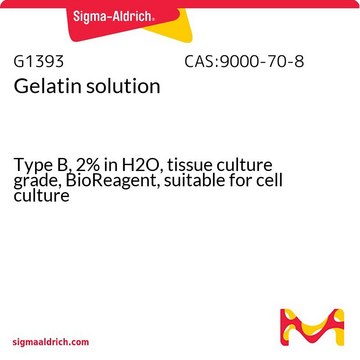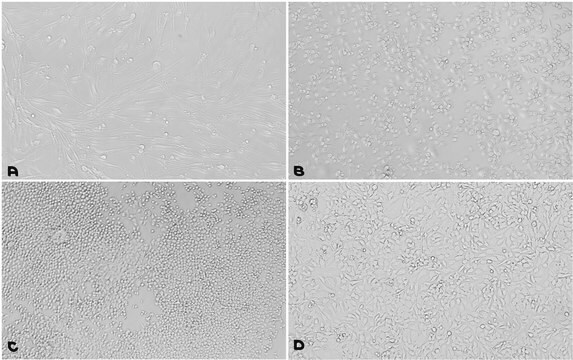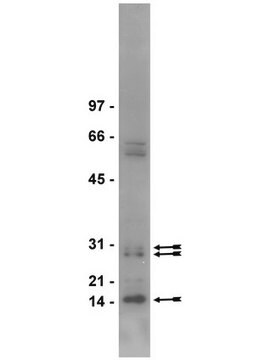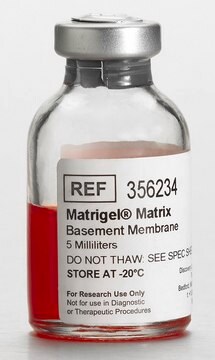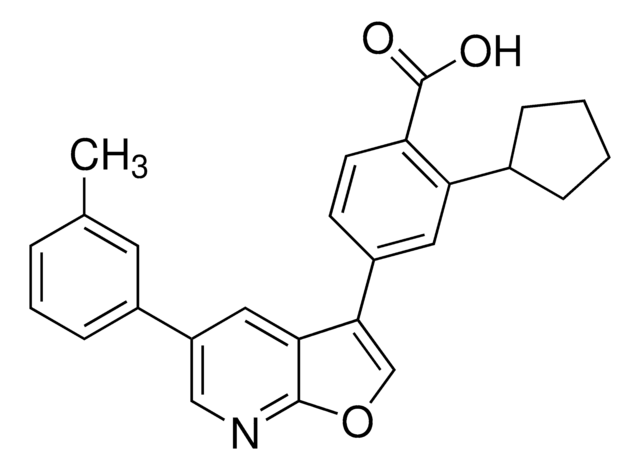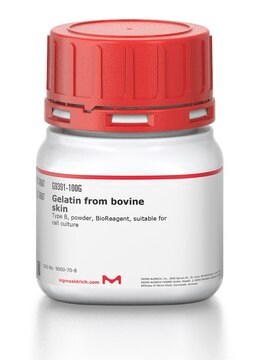R304-05A
Rat Aortic Endothelial Cells: RAOEC, adult
Synonym(e):
RAOEC cells
Anmeldenzur Ansicht organisationsspezifischer und vertraglich vereinbarter Preise
Alle Fotos(1)
About This Item
UNSPSC-Code:
41106514
NACRES:
NA.81
Empfohlene Produkte
Biologische Quelle
rat aorta (adult)
Verpackung
pkg of 500,000 cells
Hersteller/Markenname
Cell Applications, Inc
Wachstumsmodus
Adherent
Morphologie
Endothelial
Methode(n)
cell culture | mammalian: suitable
Relevante Krankheit(en)
diabetes; cardiovascular diseases
Lagertemp.
−196°C
Allgemeine Beschreibung
Lot specific orders are not able to be placed through the web. Contact your local sales rep for more details.
RAOEC from Cell Applications, Inc. provide a useful model system to study many aspects of cardiovascular function and disease. Co-culture of the artery endothelial cells with species-matched smooth muscle cells provides an ideal model for studying the interaction between these two cell types.
RAOEC from Cell Applications, Inc. have been utilized in a number of research publications to:
Additionally, RAOEC from Cell Applications, Inc. were used to investigate the reasons for differential effects of Intermedin (IMD) on permeability of endothelial cells from different vascular beds (Aslam, 2011). Specifically, it was shown that IMD increased permeability of rat coronary microvascular endothelial cells by inducing loss of VE-cadherin from cel-cell junctions, but it reduced permeability of RAOEC and HUVECs because in those cell types IMD instead caused accumulation of VE-cadherin in cell-cell junctions. These differential effects of IMD on VE-cadherin are explained by the fact that, although IMD activates cAMP/PKA and inhibits RhoA/ROCK pathways leading to rearrangement of actin in both cell types, it only causes downstream Rac1 inhibition in rat coronary microvascular endothelial cells, but not in RAOEC or HUVEC. These results highlight the fundamental differences between endothelial cells from different vascular beds and/or microvascular vs. macrovascular endothelia.
RAOEC from Cell Applications, Inc. provide a useful model system to study many aspects of cardiovascular function and disease. Co-culture of the artery endothelial cells with species-matched smooth muscle cells provides an ideal model for studying the interaction between these two cell types.
RAOEC from Cell Applications, Inc. have been utilized in a number of research publications to:
- Investigate critical signaling pathways and mechanisms relevant to proper endothelial function, such as angiogenesis, proliferation, permeability, and search for beneficial modulators for therapeutic use (Sorensen, 2008; Liu, 2009; Makino, 2009; Masuda, 2012; Gros, 2013; Nguen, 2013)
- Elucidate molecular mechanisms of various cardiovascular risk factors, including those associated with diabetes, polycystic kidney disease, treatment for allograft rejection and vascular ER stress (Makino, 2008; Chiasson, 2011, Ren, 2011; Padilla, 2013)
- Provide a gold standard control for endothelial markers vWF and PECAM/CD31 expression (Hanley, 2008; Imamura, 2010)
- Develop drug delivery system for thrombolytic treatment (Mei, 2010)and methods for cardiac regeneration (Lionetti, 2010); design better vascular implants (Ibrahim, 2008; Yao, 2008; Duffy, 2011) and bone tissue engineering (Hamid, 2014)
Additionally, RAOEC from Cell Applications, Inc. were used to investigate the reasons for differential effects of Intermedin (IMD) on permeability of endothelial cells from different vascular beds (Aslam, 2011). Specifically, it was shown that IMD increased permeability of rat coronary microvascular endothelial cells by inducing loss of VE-cadherin from cel-cell junctions, but it reduced permeability of RAOEC and HUVECs because in those cell types IMD instead caused accumulation of VE-cadherin in cell-cell junctions. These differential effects of IMD on VE-cadherin are explained by the fact that, although IMD activates cAMP/PKA and inhibits RhoA/ROCK pathways leading to rearrangement of actin in both cell types, it only causes downstream Rac1 inhibition in rat coronary microvascular endothelial cells, but not in RAOEC or HUVEC. These results highlight the fundamental differences between endothelial cells from different vascular beds and/or microvascular vs. macrovascular endothelia.
Ursprung der Zelllinie
Aorta
Anwendung
Cardiovascular function, studies on immune system and graft rejection, development of 3D endothelialized engineered tissues, drug discovery, stent-graft compatibility testing.
Komponenten
Rat Endothelial Cell Basal Medium that contains 10% FBS and 10% DMSO
Qualität
Each lot was tested for proper morphology, Population Doublings, Negative for HIV, Hepatitis B, Hepatitis C, mycoplasma, bacteria, and fungi.
Angaben zur Herstellung
- 3rd passage, >500,000 cells in Rat Endothelial Cell Basal Medium that contains 10% FBS and 10% DMSO
- Can be cultured at least to 6th passage
Subkultur-Routine
Please refer to the RAOEC Culture Protocol.
Lagerklassenschlüssel
10 - Combustible liquids
WGK
WGK 1
Flammpunkt (°F)
Not applicable
Flammpunkt (°C)
Not applicable
Hier finden Sie alle aktuellen Versionen:
Analysenzertifikate (COA)
Lot/Batch Number
Leider sind derzeit keine COAs für dieses Produkt online verfügbar.
Wenn Sie Hilfe benötigen, wenden Sie sich bitte an Kundensupport
Besitzen Sie dieses Produkt bereits?
In der Dokumentenbibliothek finden Sie die Dokumentation zu den Produkten, die Sie kürzlich erworben haben.
Mikhail A Kaplan et al.
Journal of biomaterials science. Polymer edition, 31(11), 1405-1420 (2020-04-24)
The novelty of the work lies in the creation and study of the physical and biological properties of biodegradable polymer coatings for stents based on poly(lactic-co-glycolic acid) (PLGA). Polymer coatings are capable of prolonged and directed release of molecules with
Unser Team von Wissenschaftlern verfügt über Erfahrung in allen Forschungsbereichen einschließlich Life Science, Materialwissenschaften, chemischer Synthese, Chromatographie, Analytik und vielen mehr..
Setzen Sie sich mit dem technischen Dienst in Verbindung.
